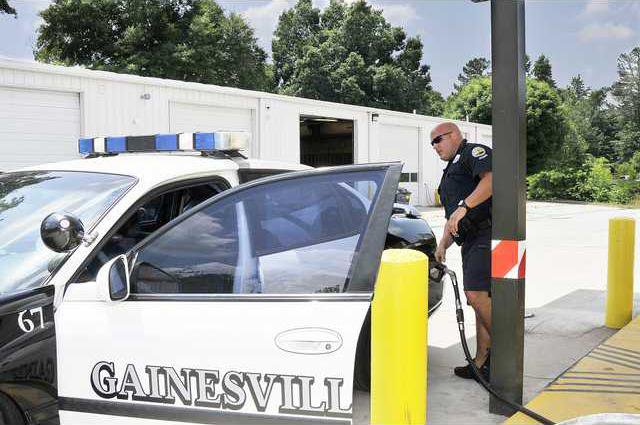They also are evidence that city government fuel use is rising with the prices.
A memo that City Manager Bryan Shuler sent to the City Council a little more than a week ago details what a few of the city’s biggest fuel-gulping departments — police, fire, public utilities and public works — are doing to conserve.
Shuler has a computer file that details which department is responsible for each of the 427,509 gallons of fuel city vehicles guzzled in the past 12 months.
The file also shows that in the last 12 months, city vehicles swallowed about 12,000 more gallons of fuel than in the previous 12-month period.
Yet the memo to the City Council stresses that Shuler has consistently reminded city department heads to do their best to conserve fuel.
Gainesville police officers have been instructed not to let their vehicles idle unnecessarily. Battalion chiefs with Gainesville’s Fire Department now make their station rounds four days a week instead of seven.
The public utilities department hired a private company to haul sludge from its water treatment plants to a field near the Allen Creek Soccer Complex.
By far, the Public Utilities Department, with more than 200 vehicles, is the largest user of city fuel. About one quarter of this year’s increase in fuel use can be attributed to the utilities department, according to Shuler’s spreadsheet.
Public Utilities Director Kelly Randall says his department is doing what it can to conserve fuel, and blames its rising consumption on growth.
In recent years, the water system has grown to serve about 2,500 new water meters each year, Randall said. "The utility is (an) urban-county utility; it’s not just limited to the city limits of Gainesville," Randall said. "... The geographic coverage has grown yearly for the last 50 years."
Randall says the department is cutting gas use where it can, changing the way water meters are read, reducing the number of vehicles that respond to after-hours problems. Randall has even asked employees who take vehicles home not to stop at grocery or convenience stores to keep from creating a public perception that utility employees are using them for personal use.
"We continue to look for ways to reduce vehicles," Randall said. "We’re very cognizant of the price of gas."
But where the gas is going may not be as big of a concern as how the city will pay for it as the costs continue to rise.
Currently, the city buys gasoline at a wholesale price from Mansfield Oil, but even at a cheaper price, the city’s wallet has taken a pinch.
From July 2007 to the end of May this year, the city has spent more than $980,000 on fuel, Shuler said.
When individual city departments spend more than they budgeted, they must cut spending on other projects in order to continue to keep their vehicles on the road.
"If a department over-spends, we want to make sure that there are funds elsewhere in those departments for making up any overages," Shuler said.
Already this budget year, the city has had to move money around to allow for another 10 percent in fuel costs than had been expected when the City Council approved the fiscal year 2008 budget.
Shuler says the current budget may have to be amended again as fuel costs continue to rise.
"We’ll have to make some further adjustments during the month of June to these department budgets to keep in balance," Shuler said.
On May 28, the city was paying $3.46 for a gallon of unleaded gasoline and $4.04 for the same amount of diesel.
That week-old price is already more than what the city expected the cost of gasoline to be in its financial plans for fiscal year 2009, which starts on July 1.
When preparing the budget for the coming budget year, city officials anticipated the rising cost of fuel — looking at paying an average of $2.92 per gallon at the wholesale price — and counted on fuel costs to be 20 percent higher than the current budget year.
But costs are already higher than that budgeted number, and Shuler is watching fuel spending closely.
"We watch it every month, and when (departments) are getting close or at their budgeted amounts, then we make adjustments accordingly," Shuler said.

